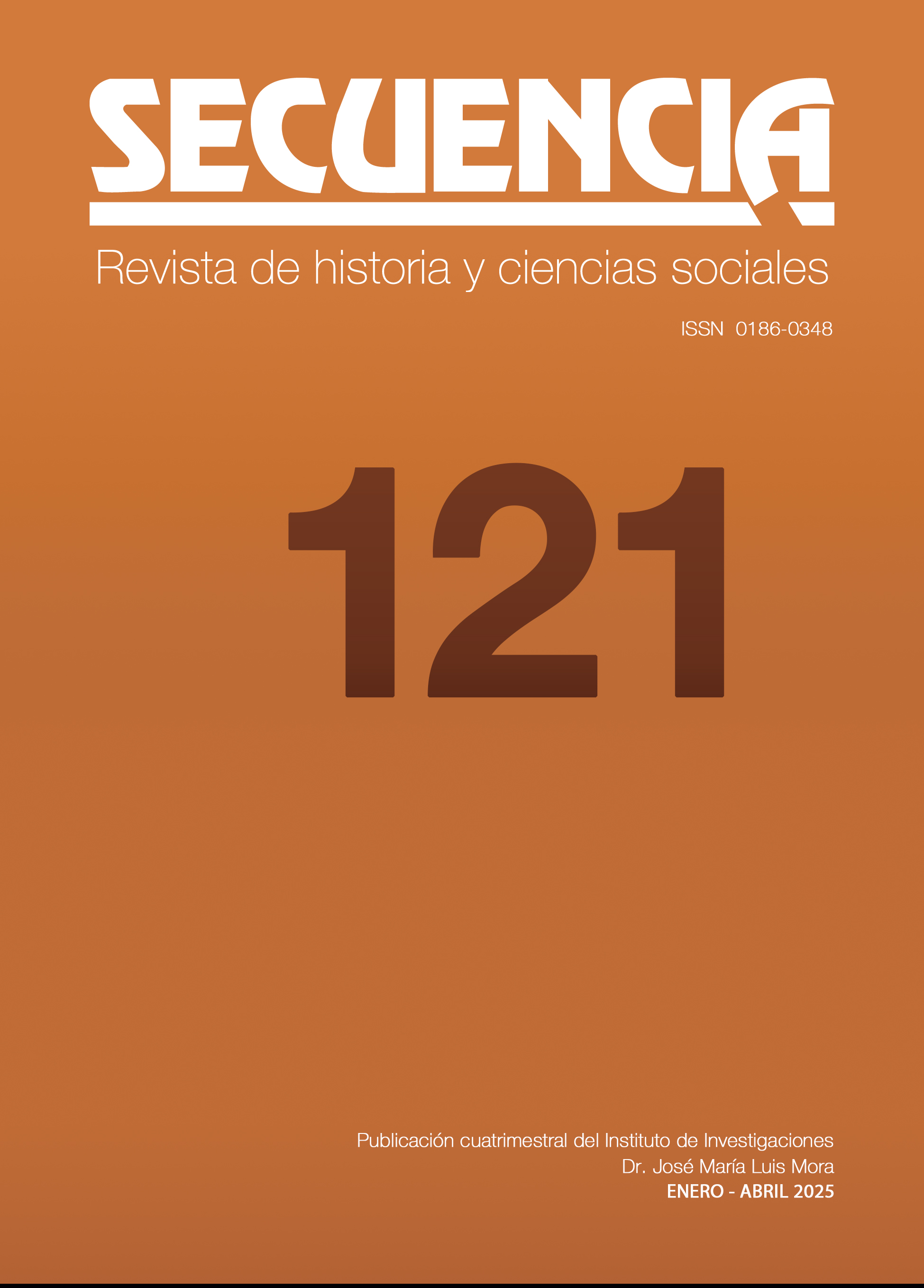Resumo
The article delves into the portrayal of China in South American leftist publications between 1950 and 1974, following China’s post-revolution period. It explores the travelogues of Latin American visitors to China, focusing on the parallels established by the authors between those two realities. Overcoming prevalent orientalist stereotypes, these texts sought to construct a bond between the regions. Drawing on Koselleck’s notion of horizon of expectation, I propose the existence of a shift in representing the East post-World War II that contributed to the creation of narratives aligning Latin America and an idealized East. After that, I outline the intellectual operation that made possible the invention of a shared past and a common future between China and Latin America based on different leftist theoretical repertoires available at that moment.
Referências
Alburquerque, G. (2010). Los intelectuales latinoamericanos y la construcción cultural del Tercer Mundo: concepto, imagen, ideología (1952-1991). História Social, 14(18), 95-116. https://doi.org/10.53000/hs.v14i18.353
Alburquerque, G. (2014). Tercermundismo en el Cono Sur de América Latina: ideología y sensibilidad. Argentina, Brasil, Chile y Uruguay, 1956-1990. Tempo e Argumento, 6(13), 140-173. https://doi.org/10.5965/2175180306132014140
Anderson, B. (2006). Imagined Communities: reflections on the origins and spread of nationalism. Verso.
Arnedo Álvarez, G. (1957). China en el camino del socialismo. Anteo.
Arnedo Álvarez, G. (1958). Elementos sobre la Revolución China. Anteo.
Beigel, F. (2003). Las revistas culturales como documentos de la historia latinoamericana. Utopía y Praxis Latinoamericana, 8(20), 105-115. https://produccioncientificaluz.org/index.php/utopia/article/view/2632
Bergel, M. (2006). Un caso de orientalismo invertido: La Revista de Oriente (1925-1926) y los modelos de relevo de la civilización occidental. Prismas. Revista de Historia Intelectual, 10, 99-117. https://www.redalyc.org/articulo.oa?id=387036781005
Bergel, M. (2015). El Oriente desplazado: los intelectuales y los orígenes del tercermundismo en la Argentina. Universidad Nacional de Quilmes.
Bernhard, G. (1964). Crónicas Chinas. Carumbé.
Castillo Ríos, C. (1973). La educación en China: una pedagogía revolucionaria. Búsqueda.
Celentano, A. (2005). Maoísmo y lucha armada: el PCML. Lucha Armada, 4.
Celentano, A. (2014). Maoísmo y nueva izquierda: la construcción de Vanguardia Comunista (1965-1969). In M. C. Tortti (ed), La nueva izquierda argentina (1955-1976) (pp. 83-109). Prohistoria.
Chartier, R. (1988). A história cultural: entre práticas e representações. Difel.
Chartier, R. (1989). Le Monde Comme Représentation. Annales. Histoire, Sciences Sociales, 44(6), 1505-1520.
Compagnon, O. (2013). L’Adieu à l’Europe. L’Amérique Latine et la Grande Guerre (Argentine et Brésil, 1914-1939). Fayard.
Galeano, E. (1964). China 1964: Crónica de un desafío. Jorge Álvarez Editor.
Generoso, L. (2019). “O povo colonizado não está sozinho”: Terceiro Mundo, anti-imperialismo e revolução nas páginas da revista Tricontinental (1967-1976). (MA diss.), Universidade Federal de Ouro Preto.
Goebel, Michael. (2013) La Argentina partida. Nacionalismos y políticas de la historia. Prometeo Libros.
Goldman, N. y Salvatore, R. (2005). Caudillismos rioplatenses: nuevas miradas a un viejo problema. Eudeba.
González Tuñón, R. (1954). Todos los hombres del mundo son hermanos: impresiones de viaje por Moscú, Kiev, Leningrado, Pekín, Tientsin, Nanking, Shanghai, Hanchow, Praga, Lidice y una visión de Varsovia. Editorial Poemas.
Hartog, F. (1991). Le Miroir d’Hérodote: essai sur la représentation de l’autre. Gallimard.
Hollander, P. (1998). Political Pilgrims: western intellectuals in search of the good society. Routledge.
Hubert, R. (2015). Sinology on the edge: Borges’s reviews of Chinese literature (1937-1942). Variaciones Borges, 39, pp. 81-101.
Koselleck, R. (2004). Futures past: on the semantics of historical time. Columbia University Press.
Kordon, B. (1962). Reportaje a China. Editorial Treinta Días.
Kordon, B. (1969). China o la revolución para siempre. Jorge Álvarez Editor.
Lee, C. J. (2010). Between a moment and an era: The origins and afterlives of Bandung. In C. Lee, Making a world after empire. The Bandung moment and Its political afterlives (pp. 1-42). Ohio University Press.
Lee, A. P. (2018). Mandarin Brazil: race, representation, and memory. Stanford University Press.
Locane, J. y Montt Strabucchi, M. (2020). Cultura China y Capricornio. Dos proyectos pioneros para el comercio simbólico (y material) entre América Latina y China. Revista Izquierdas, 49, 2521-2544.
Lovell, J. (2015). The uses of foreigners in Mao-era China: “Techniques of Hospitality” and International Image-building in the People’s Republic, 1949-1976. Transactions of the Royal Historical Society, 25, 135-158. https://doi.org/10.1017/S0080440115000067
Lovell, J. (2019). Maoism: a global history. Vintage.
Mahler, A. G. (2018). From Tricontinental to the Global South: race, radicalism, and transnational solidarity. Duke University Press.
Marchesi, A. (2019). Latin America’s radical left. Rebellion and cold war in the global 1960s. Cambridge University Press.
Montt Strabucchi, M. (2010). The PRC’S cultural diplomacy towards Latin America in the 1950s and 1960s. International Journal of Current Chinese Studies, 1, 53-84.
Montt Strabucchi, M. (2016). “Writing about China”. Latin American travelogues during the cold war: Bernardo Kordon’s 600 millones y uno (1958), and Luis Oyarzún’s Diario de Oriente, Unión Soviética, China e India (1960). Caminhos da História, 21(1), 93-124. https://www.periodicos.unimontes.br/index.php/caminhosdahistoria/article/view/1250
Oliver, M. R. y Frontini, N. A. (1955). Lo que sabemos hablamos: testimonios sobre la China de hoy. Ediciones Botellas al Mar.
Ortega, J. (2020). Viajeros mexicanos a la China “roja” y la comuna popular. Estudios de Asia y África, 55(3), 543-570. https://doi.org/10.24201/eaa.v55i3.2606
Oyarzún, L. (2016). Diario de Oriente: Unión Soviética, China e India. Ediciones Universidad Austral de Chile (Kindle edition).
Palieraki, E. (2020). Revolutions entangled. Chile, Algeria, and the Third World in the 1960s and 1970s. In T. Field, S. Krepp y V. Pettinà, Latin America and the global cold war (pp. 274-300). The University Press of North Carolina.
Pešta, M. (2022). The leftist “Imagined Community”: The transnational imagination of the left-wing subversive organizations in Western Europe. Historical Reflections/Réflexions Historiques, 48, 79-104. https://doi.org/10.3167/hrrh.2022.480205
Pomar, W. (2013). Pedro Pomar: uma vida em vermelho. Editora Fundação Perseu Abramo.
Prashad, V. (2008). The darker nations: A people’s history of the Third World. The New Press.
Ratliff, W. (1969). Chinese Cultural Diplomacy Toward Latin America, 1949-1960. Hispanic American Historical Review, 49(1), 53-79. https://doi.org/10.1215/00182168-49.1.53
Ratliff, W. (1972). Communist China and Latin America, 1949-1972. Asian Survey, 12(10), 846-863. https://doi.org/10.2307/2643063
Ribeiro, J. F. (2014). “A centelha vem do campo”: o Partido Comunista do Brasil, o maoísmo e a luta revolucionária da década de 1950. Revista Convergência Crítica, 6, 2-24. https://doi.org/10.22409/rcc.v2i4.1279
Riva, C. de la (1961). Donde nace la aurora. Estampas de la Nueva China. Ediciones Nueva Era.
Rokha, P. de (2020). China Roja. Ediciones Estrofas del Sur.
Rothwell, M. D. (2013). Transpacific revolutionaries: The Chinese revolution in Latin America. Routledge.
Rovetta, V. (1968). China: el derecho a rebelarse. Nativa Libros.
Rovetta Dubinsky, P. V. (2020). Los años setenta en China: recuerdos de un Oriental en Oriente. Universo de Letras.
Rupar, B. (2017). El Partido Vanguardia Comunista: elementos para avanzar en una caracterización del maoísmo argentino (1965-1971). Revista Izquierdas, 36, 105-125. https://dx.doi.org/10.4067/S0718-50492017000500105
Rupar, B. (2020). Viajeros argentinos a China en el marco de la “diplomacia entre pueblos” (1950-1965). Cahiers des Amériques Latines, 94, 203-227. https://doi.org/10.4000/cal.11645
Sarlo, B. (1992). Intelectuales y revistas: razones de una práctica. America, Cahiers du CRICAL, 9/10, 9-16. https://www.persee.fr/doc/ameri_0982-9237_1992_num_9_1_1047
Shicheng, X. (2006). Las diferentes etapas de las relaciones sino-latinoamericanas. Nueva Sociedad, 203, 102-113. https://nuso.org/articulo/las-diferentes-etapas-de-la-relacion-sino-latinoamericanas/
Spence, J. D. (1999). The Chan’s great continent: China in western minds. Norton.
Suri, J. (2003). Power and protest: global revolution and the rise of détente. Harvard University Press.
Taboada, H. (1998). Un orientalismo periférico: viajeros latinoamericanos, 1786-1920. Estudios de Asia y África, 33(2), 285-305. https://doi.org/10.24201/eaa.v33i2.1476
Taboada, H. (2008). La sombra del Oriente en la independencia americana. In S. Nagy-Zekmi (ed.), Moros en la costa: Orientalismo en Latinoamérica (pp. 25-40). Iberoamericana.
Telles, L. F. (2011). Passaporte para a China: crônicas de viagem. Companhia das Letras.
Teng, W. (2020). Doubts and puzzles: young Galeano writing about New China during the Sino-Soviet Split. Transmodernity: Journal of Peripheral Cultural Production of the Luso-Hispanic World, 9(3), 138-160. https://doi.org/10.5070/T493048195
Urrego, M. Á. (2017). Historia del maoísmo en América Latina: entre la lucha armada y servir al pueblo. Anuario Colombiano de Historia Social y de la Cultura, 44(2), 111-135. https://doi.org/10.15446/achsc.v44n2.64017
Zhang, K. y Xie, X. (2019). “Call me comrade not mister”: Vicente Rovetta and the spread of Maoism in Latin America’s Global Sixties. The Sixties, 12(2), 205-237. https://doi.org/10.1080/17541328.2019.1686818
Wang, Siwei. (2019). Transcontinental revolutionary imagination: Literary translation between China and Brazil (1952-1964). The Cambridge Journal of Postcolonial Literary Inquiry, 6(1), 70-98. https://doi.org/10.1017/pli.2018.35
Wolin, P. (2010). The Wind from the East: French intellectuals, the Cultural Revolution and the legacy of the 1960s. Princeton University Press.

Este trabalho está licenciado sob uma licença Creative Commons Attribution-NonCommercial 4.0 International License.
Copyright (c) 2024 Thiago Prates




